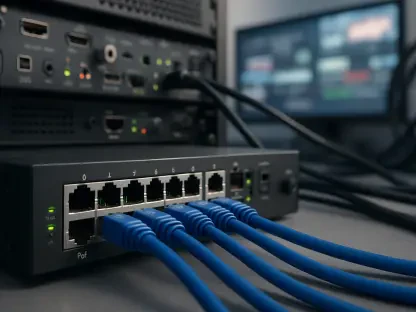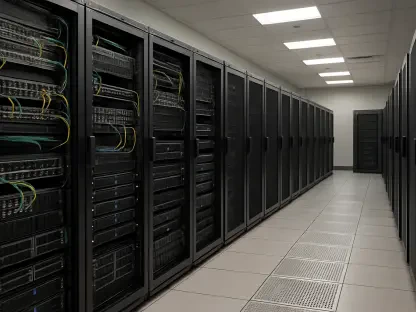In today’s rapidly evolving environment of cybersecurity, where the race against time often determines the difference between security and vulnerability, the value of actions over mere words becomes vividly clear. Matilda Bailey, a renowned expert in networking and cutting-edge wireless technologies, shares her insights on how focusing on execution rather than discourse impacts success both in professional arenas and personal endeavors. This conversation is particularly relevant for those at the start of their journey in security professions.
What did Rene Descartes mean when he said, “To know what people really think, pay attention to what they do, rather than what they say,” and how does it relate to your career in security?
Descartes’ quote underscores the crucial idea that actions often reveal a person’s true intentions and competence far more than words ever could. In my security career, I’ve observed this firsthand—professionals who may speak eloquently about security strategies but fail to implement them effectively don’t make the real impact. It’s the consistent execution of actions aligned with one’s commitments that reveals genuine expertise and achieves lasting security.
Why do you believe focusing on actions over words is critical for long-term career success?
Focusing on actions rather than words embodies reliability and trustworthiness, foundations for long-term success in any career. In security, where stakes and pressure are high, delivering consistent results builds a reputation that can weather any storm. Words alone cannot shield an organization from threats, but proven actions create tangible defenses and engender confidence among peers and clients.
Could you give an example from your own experience where actions spoke louder than words?
Early in my career, I worked on a project with severe time constraints. There was lots of discussion about the challenges we faced, but I chose to dive in and solve issues one step at a time. My ability to stay focused and deliver results convinced stakeholders of our team’s capability and led to the successful completion of the project. This was a pivotal moment in establishing my credibility and reinforcing the principle that actions speak louder than words.
How does the concept of doing rather than talking apply to staying in shape?
Staying in shape epitomizes the philosophy of action over talk. Fitness isn’t achieved by discussing gym routines but by engaging in consistent exercise. It’s those who quietly lace up their shoes and hit the pavement day after day that embody a commitment to their health, much like those who take decisive action in security are the ones who actually enhance safety.
What differences do you observe between people who talk about dieting versus those who successfully maintain their weight?
People who often talk about their diets may capture attention but don’t always achieve lasting results. Those who manage their weight successfully tend to quietly adhere to healthy eating habits, demonstrating discipline over what they consume, much like the persistence required for success in security. Their focus on steady action rather than discussion is what leads to enduring health.
In the security field, what are some ways professionals can focus on action rather than discussion when it comes to writing?
Writing in the security field demands discipline much like effective weight management. It’s essential to commit to a structured routine of drafting, revising, and finalizing documents, rather than falling into lengthy debates about what needs writing. Consistent practice and execution lead to completed technical guides and reports that are crucial for knowledge sharing and advancement in our field.
How do top security professionals effectively manage demanding schedules and stay productive?
Top professionals thrive by prioritizing effectively, knowing what deserves immediate attention, and what can be deferred or dismissed. Mastery of time management involves a keen focus on goals, minimizing distractions, and optimizing workflows—principles that allow them to deliver on their promises while ensuring continued professional growth.
Can you describe what being prepared generally involves and why it matters in your field?
Preparation is often unseen but utterly vital in security, as it involves laying the groundwork for robust responses to unforeseen challenges. It means having backup plans, continuously honing skills, and staying updated with industry trends, which in turn allows professionals to act swiftly and confidently when security threats materialize.
How do you approach developing new content, and why is it important for audiences?
Creating new content is about deeply understanding your audience’s needs and delivering fresh perspectives or insights that haven’t been repeated ad nauseam. This requires a commitment to research and innovation, ensuring that the information shared adds value and keeps audiences engaged, which is especially important in the dynamic world of cybersecurity.
What advice would you give to someone who finds themselves getting distracted by “attractive distractions” and extravagant promises?
My advice is to stay centered on what truly aligns with your long-term goals and consistently reassess priorities. Extravagant promises can be enticing, but the real progress is often made through incremental, disciplined action. Understanding this can help in resisting distractions and focusing on meaningful work that moves the needle.
How can professionals make time for important tasks when they are inundated with responsibilities?
It’s all about effective prioritization and boundary-setting. Professionals must identify critical tasks and dedicate time blocks to focus on these without interruptions. It’s equally crucial to learn to say no to tasks that don’t align with core objectives, thus preserving energy and focus for endeavors that truly matter.
Why is it crucial to focus on doing what needs to be done instead of discussing it excessively?
Consistent action builds a track record of reliability, whereas excessive discussion often stifles progress without delivering results. In rapidly moving fields like cybersecurity, problems require immediate solutions. Deliberation must have its place, but execution is critical and what ultimately drives value.
Have you ever witnessed a situation where someone gained respect by consistently delivering on their promises? Could you share that experience?
Absolutely. I once worked with a peer who consistently pushed through difficult projects without much fanfare. Her commitment to meeting deadlines and effectively solving problems quietly earned her the respect of our department. Watching her success taught me the importance of consistent delivery over flashy talk.
In what ways can playing the “long game” be beneficial to a person’s professional life?
Playing the long game cultivates endurance and resilience. It emphasizes strategic thinking over impulsive decisions, allowing professionals to build robust careers by focusing on growth, learning, and relationships that culminate in solid reputations and prospects.
What lessons can security professionals learn from observing the actions of their peers or mentors?
Observation offers profound lessons in what strategies and behaviors lead to success or failure. By analyzing the outcome of peers’ actions, professionals can emulate effective practices, avoid common pitfalls, and refine their approaches for better results.
What key qualities do you think are necessary for someone aiming to become a top security professional?
A top security professional needs unwavering integrity, the discipline to continuously learn, and the agility to adapt to new challenges. Equally important is a collaborative spirit, where one can work efficiently with teams while demonstrating individual accountability.
What are some potential pitfalls of over-communicating one’s intentions rather than focusing on tangible results?
Over-communicating can lead to unmet expectations and credibility loss. When promises aren’t backed by action, trust erodes. Emphasizing outcomes over intention maintains professional relationships and demonstrates reliability, which is crucial in building long-term success.
Can you share your thoughts on how one can resist the temptation to focus too much on dialogue and less on execution?
Resisting this temptation involves vigilant self-awareness and reminding oneself of past successes achieved through action. Setting regular goals and reflecting on accomplishments can help maintain focus on execution, ensuring progress in professional endeavors.
How can professionals identify their priorities to ensure they focus on doing rather than talking?
Professionals should periodically review their goals and key deliverables, fostering an environment where they can regularly assess what truly impacts their progress. This reflection helps clarify priorities, keeping actions aligned with core objectives and reducing empty talk.
How would you describe your approach to balancing preparation and spontaneity in your projects and tasks?
Balancing preparation with spontaneity requires a foundation of thorough planning paired with the flexibility to adapt as new situations arise. It’s about being ready yet open to innovate, applying structure when necessary while allowing room for creative, on-the-fly problem-solving.









